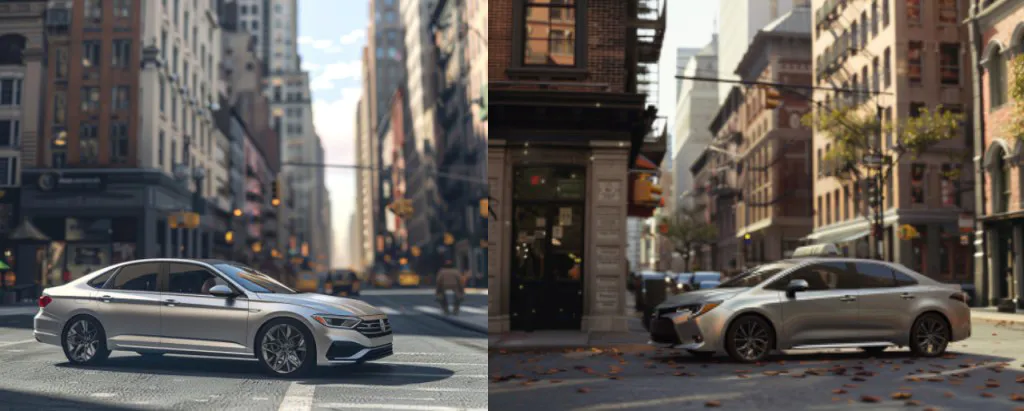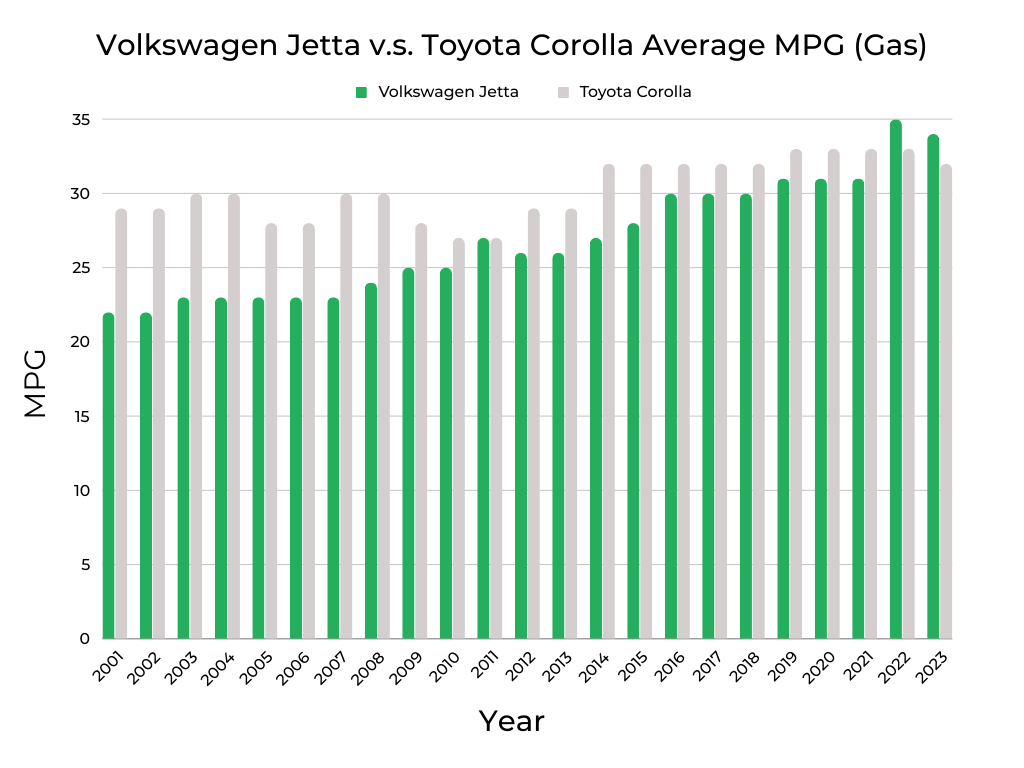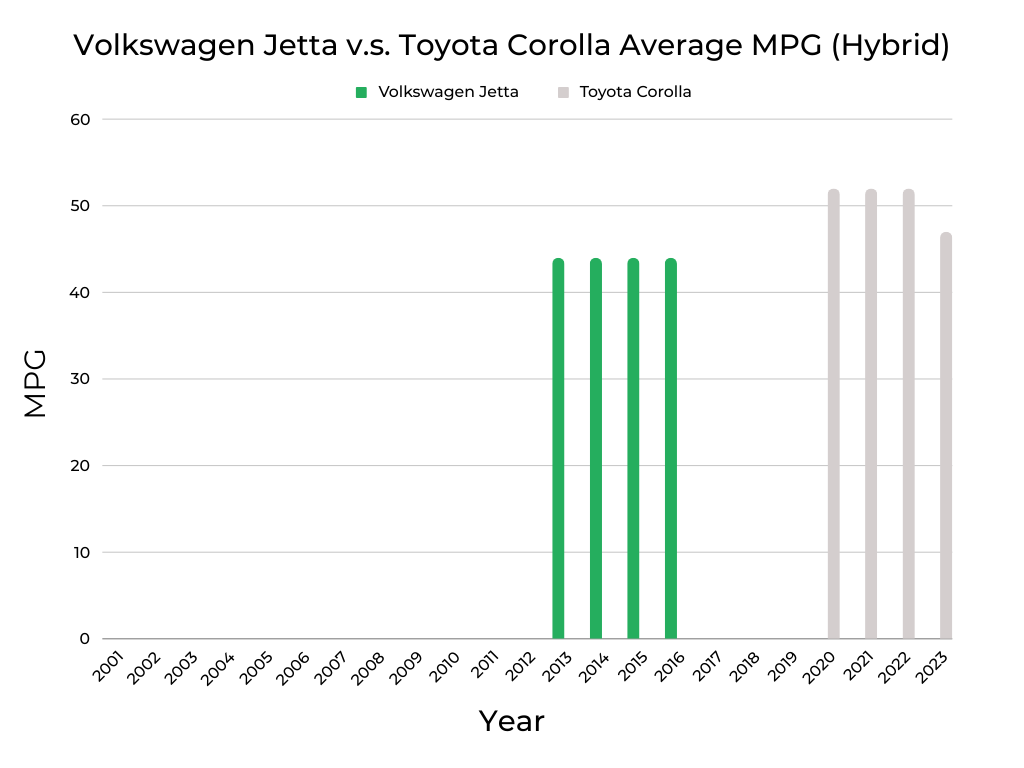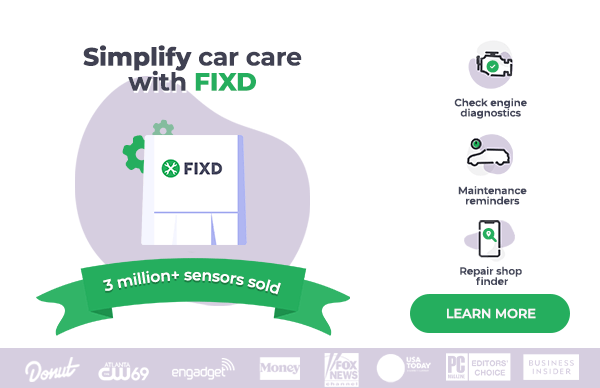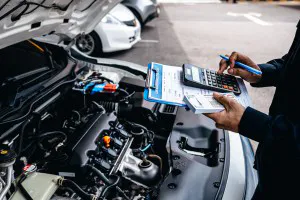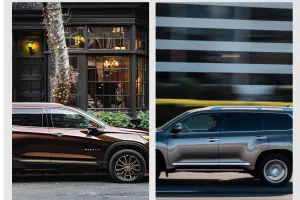Comparing the Volkswagen Jetta and Toyota Corolla reminds me of a not-to-long-ago experience while renting a car. Standing at the counter, I was given the choice between a Jetta and a Corolla. Without hesitation, I picked the VW to squeeze some driving enjoyment out of a mundane trip. Rental car Jettas are no canyon carvers, but at least they’re modestly more engaging behind the wheel than a Corolla sedan.
That sums up the Jetta-Corolla contest: some European flare (even though today’s Jettas are built in Mexico) versus an unexciting car that does what’s necessary without complaint. Put another way, the Jetta is that life-of-the-party friend who might not come through in a pinch, while the Corolla is a trusted but boring pal who’ll see you through thick and thin. If you’ve ever owned a Volkswagen and a Toyota, as I have, you’ll understand the reference.
Metaphors aside, the Jetta versus Corolla match-up can be boiled down to a few key factors. All things being equal, a used Jetta will cost less than a second-hand Corolla. Why? Because the Corolla does just about everything measurable a little bit better than the Jetta.
The Corolla has a stronger resale value, lower maintenance costs, and a marginally better lifespan. In addition, newer Corollas get better safety scores, while older examples use less gas.
But don’t count out the Jetta. Besides its better driving qualities, you’ll get a more upscale cabin and a car that’s not on every street corner—elements that are hard to quantify. And, as mentioned, it’s hard to ignore that used Jettas are cheaper. Going the Volkswagen route just means being more selective about which Jetta to buy.
Keep reading to see how this Volkswagen Jetta and Toyota Corolla contest turns out. You can learn about resale values, depreciation, reliability, longevity, maintenance costs, and fuel economy—essentials to understand to make a more informed car-buying decision.
The Jetta and Corolla compete against the Honda Civic, Nissan Sentra, Ford Focus, Chevrolet Cruze, Hyundai Elantra, Mazda Mazda3, Subaru Impreza, and Kia Forte.
Other match-ups to review include Jetta vs. Civic, Sentra vs. Corolla, Outback vs. Forester, 4Runner vs. Highlander, RAV4 vs. CR-V, Civic vs. Corolla, Pilot vs. Highlander, and Odyssey vs. Sienna.
| Income Bracket | Monthly Financing Cost Range | Cash Purchase Price Range | Volkswagen Jetta Years | Toyota Corolla Years | Best Model Year: | Why? |
| < $5k | $42 – $83 | $1,500 – $3,000 | N/A | 2004 | 2004 Corolla | Low Price |
| $5k – $10k | $83 – $125 | $3,000 – $4,500 | N/A | 2007 | 2007 Corolla | Good value, above-average engine reliability |
| $10k – $15k | $125 – $187 | $4,500 – $6,750 | 2011 | 2011 | 2011 Jetta | Good value, solid safety score |
| $15k – $25k | $187 – $312 | $6,750 – $11,250 | 2016 | 2013 | 2016 Jetta | Good value, above-average engine reliability |
| $25k – $35k | $312 – $437 | $11,250 – $15,750 | 2018 | 2016 | 2016 Corolla | Very good engine reliability, excellent safety score |
| $35k – $50k | $437 – $625 | $15,750 – $22,500 | 2021 | 2019 | Tie | Good value, perfect engine reliability (Jetta), and excellent safety score (Corolla) |
See the methodology for the table above.
Before you respond to the “For Sale” ad, check out this How to Buy a Used Car article for a step-by-step checklist.
Price History Comparison | Volkswagen Jetta vs. Toyota Corolla
Average Market Value – Based on Owners’ Self-Reported Mileages | Volkswagen Jetta vs. Toyota Corolla
If you’re like most car shoppers, money is where things start. So, let’s get a handle on what buying a used Volkswagen Jetta or Toyota Corolla might cost you. The chart reflects Kelley Blue Book (KBB) private-party sales data for the Jetta (green) and the Corolla (gray). To help better put this information into perspective, owner-reported mileage (via FIXD surveys) is incorporated into the results.
Buying at a dealer will cost up to half as much more. One strategy to work around retail prices is to look for used cars from older model years or with higher mileage.
It doesn’t take a rocket scientist to figure out that a second-hand Jetta costs less than an equivalent Corolla. Some of this is due to contrasts in owner-reported mileage. For instance, owners of 2014, 2017, and 2020 Jettas have 30%-50% more mileage on their cars than their Corolla counterparts. Obviously, greater mileage drags down a car’s value.
However, there’s something else at play here: depreciation (or lack thereof in the case of the Corolla).
In 2010, a base Jetta S stickered at $18,935, while the least expensive Corolla came with an MSRP of $17,584. Fast forward a decade and a half, and the Corolla is worth about a third more than a same-year Jetta. This valuation even takes the Corolla’s lower starting price into account.
The same applies to 2015 models. The cheapest Jetta from this year came with a $17.035 window sticker, compared to an $18,385 MSRP for a base Corolla L. Again, current-day examples still show a gap in used car prices for the two models, but the amount is more significant due to the 2015 Jetta’s lower starting price.
Strong resale value means that given all factors (model year, mileage, condition, and equipment) are equal, you’ll spend more for a Corolla than a Jetta. That’s good news if you’re a VW fan looking to save money, but not if you have a Toyota mindset and a tight budget.
Keep reading to learn what makes the Corolla more valuable than the Jetta—these differences are a recurring theme in this article.
Be sure to read our Best and Worst Years series of articles highlighting the Volkswagen Jetta and Toyota Corolla winners and losers.
Depreciation vs. Maintenance Expenses
Similar to how investors aim to purchase lower-priced stocks, savvy used car shoppers also look to find value. Buyers search for a particular model year that has depreciated significantly from the new price but isn’t affected by high upkeep expenses. This balance between low upfront costs and modest ongoing maintenance expenses is the car shopper’s equivalent of “buying the dip.”
The window of opportunity for used VW Jettas is narrow, with 2004 to 2007 representing the “sweet spot.” Shop for an older model, and you’ll encounter higher repair and maintenance costs. Meanwhile, the depreciation for newer Jettas hasn’t quite bottomed out yet.
Lower upkeep costs and plunging depreciation create more target years for the Corolla: 2003 to 2012. Like with the Jetta, older examples lead to higher repair costs, while newer Corollas still have strong resale values.
We know that used Corollas typically cost more than second-hand Jettas, but a VW versus Toyota comparison isn’t the point of this buying the dip exercise. Instead, the idea is to identify the best model years among each nameplate.
But don’t assume every example within these ranges is a smart buy. Learn more by reviewing the best and worst years of the Volkswagen Jetta and Toyota Corolla. There’s also an at-a-glance summary towards the end of this article.
Reliability Comparison | Volkswagen Jetta vs. Toyota Corolla
Two ratings are at the core of our look at the Volkswagen Jetta and Toyota Corolla.
- The FIXD Reliability Score measures the number of check engine lights recorded for a particular model year by installed FIXD sensors. Think of it as an engine reliability score. While every check engine light doesn’t directly translate into reliability concerns (such as a dead battery or loose gas cap), these indicators still provide insight into a car’s dependability. This data is weighted by mileage.
- The second rating is the Owner Reliability Score. This is a subjective ranking of how surveyed owners feel about their respective vehicle’s dependability. Each owner estimates how capable their car is for trips of different lengths. A vehicle that can handle a cross-country adventure receives the highest score, while a car only suitable for a quick point A to point B trip gets the lowest score.
Both rankings are based on 1 being the lowest, 10 being the highest, and 5 being the average score.
We’ll also point out that both scores seldom align. The FIXD Reliability Score is determined by a definitive number, the frequency of check engine lights. On the other hand, the Owner Reliability Score is opinion-based. Owners tend to have pride in their automobiles, with higher ratings as a result. At a minimum, those with older vehicles are more accepting of check engine lights. For many, it’s the price of owning an aging car.
Arguably, reliability is one of the greatest influencers on a model’s depreciation. FIXD Reliability Scores reinforce this point, especially when assessing engine dependability for Jettas and Corollas built before 2012. While these older Toyotas are far from perfect, at least half of these Corolla model years achieve an average FIXD Reliability Score of 5 (out of 10). The same can’t be said for 2001-2011 Jettas. In fact, none of these VWs scored above 4.
However, the Jetta’s engine dependability fortunes changed dramatically, starting with the 2012 model year. First of all, its FIXD Reliability Score never dipped below 5. The Jetta outscores the Corolla for five of these ten model years (2012-2021). The Corolla only does better for the 2012, 2016, and 2018 models. Engine reliability is a tie for 2015 and 2021.
The Jetta’s depreciation trend line from the previous section (Depreciation vs. Maintenance Expenses) mirrors the improved reliability scores for newer Jettas. Funny how that works.
At the same time, FIXD Reliability Scores for newer Corollas are a mixed bag. In particular, engine dependability for the 2014, 2015, and 2017 model years is mediocre at best, underscoring that reputation can be as important as hard data.
Owner perceptions about the Jetta and Corolla often deviate from reality. Those with these older VWs in the driveway aren’t overly negatively influenced by the abundance of check engine lights. The same is true for Corolla owners, with a majority giving their cars a 6 or better for believed dependability.
The one unusual exception involves the 2001 Corolla. Despite getting a mid-tier FIXD Reliability Score of 5 (commendable for a 23-year-old car), owners are less generous. An Owner Reliability Score of 1 signals problems outside of the engine bay.
Review the Best and Worst Years articles on the Volkswagen Jetta and Toyota Corolla to learn more about these vehicles’ FIXD Reliability and Owner Reliability Scores.
Longevity Comparison | Volkswagen Jetta vs. Toyota Corolla
Writing about these best model year comparisons always includes a bit of curiosity on my part, especially when it comes to vehicle longevity. Do preconceived notions match the data?
Expectations that an automobile can at least reach 150,000 miles are reasonable in this day and age. Clearly, this benchmark doesn’t appear to be a problem for the Volkswagen Jetta and Toyota Corolla, according to FIXD owner surveys. Further, some owners are well on their way to (and some have passed) 200,000 miles. Yet, this feedback doesn’t indicate a definitive winner in the lifespan contest; there are near equal numbers of Jetta and Corolla model years with 150,000 miles or more under their respective belts.
So, let’s take a different approach to assessing vehicle lifespan by reviewing listings from autotrader.com (February 20, 2024). This research shows 792 Jettas and 1425 Corollas from 2001-2012, examples most likely to have more miles on thor odometers.
Of these listings, 179 (22.6%) Jettas and 373 (26.2%) Corollas have 150,000-200,000 miles. Further, there are 45 (5.7%) Jettas and 122 (8.6%) Corollas with at least 200,000 miles of use.
The results suggest that Corollas have a slight edge in longevity over Jettas and that 200,000 miles is the typical end-stage for both cars.
For a more thorough look at longevity, review the individual articles on the best and worst years of the Volkswagen Jetta and Toyota Corolla.
Who Should Buy These Cars: The Legacy of Volkswagen Jetta vs. Toyota Corolla
FIXD surveys confirm that 38% of Jetta owners and 43% of Corolla owners rely on their cars for family transportation. The numbers flip—44% for the Jetta and 37% for the Corolla—when it comes to vehicle use for long commutes and road trips (we call this “lots of driving”). Both tasks require vehicles with good safety scores and fuel economy (factors that are covered later).
Unsurprisingly, the Jetta and Corolla don’t see much activity for off-road travel or towing. Shoppers likely to see this type of use should consider other vehicle options. The same goes for “luxurious driving” and “sport/fast driving,” although the Jetta GLI and Toyota GR Corolla break the economy car mold.
| Frequent Use Categories: | Volkswagen Jetta | How Useful? (Out of 5 Stars) | Toyota Corolla | How Useful? (Out of 5 Stars) |
| Family Vehicle | * * * * | * * * * |
| Lots of Driving (travel/long commute) | * * * * * | * * * * * |
| Hauling/Towing | * | * |
| Office on Wheels | * | * |
| Sport/Fast Driving | * | * |
| Luxurious Driving | * | * |
| Outdoor/Off-Road | * | * |
Driver Experience | A Summary of The Top 10 Volkswagen Jetta vs. Toyota Corolla Posts:
The Volkswagen Jetta versus Toyota Corolla debate gets much attention on Reddit. Here’s an overview of some of the most popular conversations from Reddit: r/whatcarshouldIbuy.
Reliability and Value
In discussions across Reddit, the Toyota Corolla is frequently praised for its reliability, with many users recommending it for its dependability and lower maintenance costs compared to the Volkswagen Jetta. One Redditor mentioned, “Corollas have awesome security features, including door locks, keys, and alarms. They are also one of the most reliable cars of this millennium.”
Another commenter highlighted the Corolla’s resale value and reliability as key factors, suggesting that while the Jetta offers good value for the money, the Corolla’s long-term reliability might make it a better choice.
The Jetta, however, is not without its supporters; some users appreciate its features for the price, including Android Auto/Apple CarPlay and blind-spot detection, which the Corolla does not offer in certain trims.
Comfort and Performance
The interior and driving experience also came under scrutiny, with several users favoring the Jetta for its more modern and refined interior and its driving dynamics. One Redditor stated, “The Jetta is more fun to drive, looks better, and the interior is far beyond better.” The Jetta’s warranty was also mentioned as a significant advantage, with a six-year warranty offering peace of mind to potential buyers.
However, the Corolla was often described as a more practical and reliable choice, if somewhat less exciting, with one commenter noting, “Toyota is a great car, but it’s boring in all aspects.”
Functionality and Resale
Functionality-wise, the Jetta was praised for its technological features, while the Corolla was lauded for its standard safety tech and overall lower cost of ownership. The resale value of the Corolla was frequently cited as a strong point, with its reliability contributing to a slower depreciation rate. One Redditor advised, “If you’re planning to keep it very long term, the Corolla is probably the safer choice.”
Reddit Recap
Overall, Reddit users tend to lean towards the Toyota Corolla for its reliability, lower maintenance costs, and better resale value, making it a preferred choice for those looking for a long-term vehicle. The Volkswagen Jetta, however, holds its ground with a more engaging driving experience, modern interior, and appealing tech features, catering to those who prioritize comfort and performance.
Year-by-Year Comparison | Volkswagen Jetta vs. Toyota Corolla
Best & Worst Years | Volkswagen Jetta vs. Toyota Corolla | 2001-2024
Remember the Jetta’s low engine reliability scores among older model years? They’re the principal reason why it’s best to avoid examples from 2001-2010. This doesn’t mean that every Jetta from these years is a huge repair bill in hiding, but the odds of running into expensive problems are more likely.
It’s slightly better for older Corollas. At least editions from 2004 and 2007-2008 get a green light. A FIXD Reliability Score of 7 (out of 10) for the 2007 Corolla is admirable, making this model year a must-shop used car for anyone on a tight budget.
Choices significantly expand when newer Jettas and Corollas enter the picture. VW shoppers have a wide range of Jettas—2011 to 2021—to consider, ensuring there are options for most wallets. The same applies to the majority of Corollas built since 2010. Just steer clear of the 2020 model year.
I’ll also call attention to the undecided years (yellow) only because there isn’t enough information to give these editions a thumbs up or down.
Important Features Timeline | Volkswagen Jetta vs. Toyota Corolla
While the Jetta and Corolla fall into the economy car category, Volkswagen has always positioned its entry as a bit of a more upscale offering. As a result, the Jetta is usually first with key features before the Corolla. Examples include heated front seats, Apple CarPlay, and Android Auto.
Further, blind-spot monitoring appeared in the Jetta five years ahead of the Corolla. The Corolla did get lane departure warning in 2017, two years before the Jetta. The Corolla was also the first with remote start. Yet, this has as much to do with German automakers being behind the times with this feature as remote start is illegal in many European countries.
Plus, there’s equipment in the Jetta that has yet to show up in the Corolla: parking sensors, a power front passenger seat, ventilated front seats, and a driver’s memory system. However, the Corolla gets bonus points for offering all-wheel drive on select hybrid editions.
Maintenance Costs (Year-by-Year Average) | Volkswagen Jetta vs. Toyota Corolla
Given the poor engine reliability ratings for older Jetta, seeing the soaring maintenance costs isn’t unusual. Across all years, the typical Jetta owner spent $749 in 2022 on maintenance and repairs, according to FIXD surveys. Meanwhile, Corolla owners spent 18% less, $614. In comparison, RepairPal says that the average compact car costs $526 annually to maintain.
The most expensive-to-own Jetta years are 2001, 2002, 2005, 2007, 2010, and 2011. All of these had upkeep expenses of 20% or more above the $749 average, with several years costing owners over $1,000 in annual maintenance and repair costs.
Yet, the Corolla has its share of offending years. The 2001, 2002, 2004, 2007, 2011, 2013, and 2016 model years all had upkeep costs that exceeded the $614 average by at least 20%.
Review the best and worst years of the Volkswagen Jetta and Toyota Corolla to learn more about maintenance and repair costs for these vehicles.
Safety Rating Comparison | Volkswagen Jetta vs. Toyota Corolla
The Jetta’s and Corolla’s safety performance is divided into two periods: before and after 2011. Prior to 2011, the Jetta held a slight advantage, particularly in the early years of the 21st century. In 2011, the National Highway Traffic Safety Administration (NHTSA) instituted more stringent testing standards, causing Jetta and Corolla crash scores to drop (many automakers were impacted).
After 2011, the Corolla outperformed the Jetta in these government assessments. Any score above 4.0 (out of 5.0) is good, but the Corolla did better. Post-2011 models of either car offer more than adequate protection, but safety-obsessed buyers will be comfortable knowing that new Corollas come out on top.
More details about crash test safety scores are covered in the Volkswagen Jetta and Toyota Corolla articles.
Fuel Efficiency Comparison | Volkswagen Jetta vs. Toyota Corolla
The Corolla continues its modest edge over the Jetta with better fuel economy (for models with conventional internal combustion engines). The difference is more substantial in the early years, but nonetheless, the Corolla costs less at the pump. The Jetta doesn’t come out ahead until the most recent years.
Hybrid versions add an interesting twist to the fuel economy story for these cars. VW’s efforts in the area produced impressive results, with 2013-2016 Jettas offering almost 45 MPG. That’s quite an accomplishment for a decade ago. But before you get too excited about a hyper-fuel-sipping Jetta, understand these editions are scarce. Autotrader reports about 30 for sale across the U.S. as of this writing. Any used hybrid under consideration should undergo a rigorous pre-purchase inspection to ensure the traction battery (the main hybrid) has adequate life.
Meanwhile, Toyota added to the Corolla’s versatility by introducing a hybrid edition for 2020. Fuel economy in the 50 MPG range is stellar and especially appealing to a Toyota fan who doesn’t want to drive a quirky Prius.
You may recall VW’s 2015 “Dieselgate” fiasco when the company installed software to cheat emissions tests in 2009-2015 diesel vehicles, including Jettas. The cars met lab standards but created more pollution on roads. VW bought back affected models, installed new software, and returned many of these vehicles to the market. You can find Jetta Diesels to buy, but because the fuel economy of these vehicles is uncertain, they’ve been excluded from this comparison.
Methodology
- Compare two vehicles, the Volkswagen Jetta and the Toyota Corolla, and provide a comprehensive analysis.
- Gather relevant information and data on both vehicles from reliable sources, such as manufacturer specifications, expert reviews, customer feedback, industry reports, and data sources like manufacturer websites, FIXD App, Kelley Blue Book, FuelEconomy.gov, and NHTSA.
- Collect data on various aspects, including performance, safety features, fuel efficiency, maintenance costs, reliability, owner satisfaction, and market value.
- Identify the key criteria that will be used to evaluate and compare the two vehicles.
- Ensure the criteria cover both objective factors (such as performance metrics, safety ratings, and fuel efficiency) and subjective factors (such as owner satisfaction, comfort, and features).
- Examine the safety features and ratings of both vehicles.
- Evaluate crash test ratings, advanced driver assistance systems (ADAS), active and passive safety features, and any notable recalls or known issues related to safety.
- Consider both NHTSA safety ratings and IIHS awards for a comprehensive safety assessment.
- Analyze the fuel economy of both vehicles based on EPA mileage estimates.
- Compare their MPG ratings, average full-tank range, and any significant differences in fuel efficiency.
- Assess the average annual maintenance and repair costs for both vehicles.
- Consider data from surveyed owners and other reliable sources, such as FIXD App owner surveys, to determine the overall cost of ownership over time.
- Evaluate the reliability of both vehicles based on owner reports, FIXD App data, and any known issues or recalls.
- Consider factors such as engine reliability, common problems by model year, long-term durability, and owner reliability scores gathered from surveys.
- Consider owner satisfaction by gathering information from forums, online communities (Reddit: r/whatcarshouldIbuy), customer reviews, and owner reliability scores.
- Summarize key factors that owners appreciate and any common complaints or drawbacks mentioned by owners.
- Compare the features and technologies offered by both vehicles.
- Highlight any notable differences in terms of infotainment systems, connectivity options, driver assistance features, interior quality, and available upgrades.
- Assess the market value and depreciation of both vehicles.
- Compare average prices, resale value, and how the vehicles hold their value over time.
- Consider average private-seller valuations from Kelley Blue Book (KBB) for a comprehensive assessment.
- Summarize the findings of the comparison, highlighting the positives and negatives of each vehicle.
- Provide a fair and balanced recommendation based on the comparison, considering factors such as budget, personal preferences, specific needs of the buyer, and the comprehensive analysis conducted.
Sources:
- KBB Values: Average private-seller valuations as supplied by Kelley Blue Book (KBB), based on a Volkswagen Jetta and Toyota Corolla with typical mileage for that respective model year.
- Fuel Economy: Mileage-per-gallon estimates according to the EPA MPG on Fueleconomy.gov.
- Annual Maintenance/Repairs: Upkeep expenses as reported by surveyed Volkswagen Jetta and Toyota Corolla owners.
- Safety Ratings: Crash test data collected and reported by NHTSA. We average all ratings for each year to come up with a simplified, average safety score. This makes it easier to look at on a graph. We also collected IIHS Awards for this
article.

Dave Goldberg is an automotive journalist and lifelong car fanatic. He writes for numerous enthusiast and business outlets and is an ongoing contributor to HotCars.com, one of the most popular car culture websites. When he’s not writing or driving, Dave is either under a hood or asleep. His credentials include a BA in Journalism from The George Washington University.

